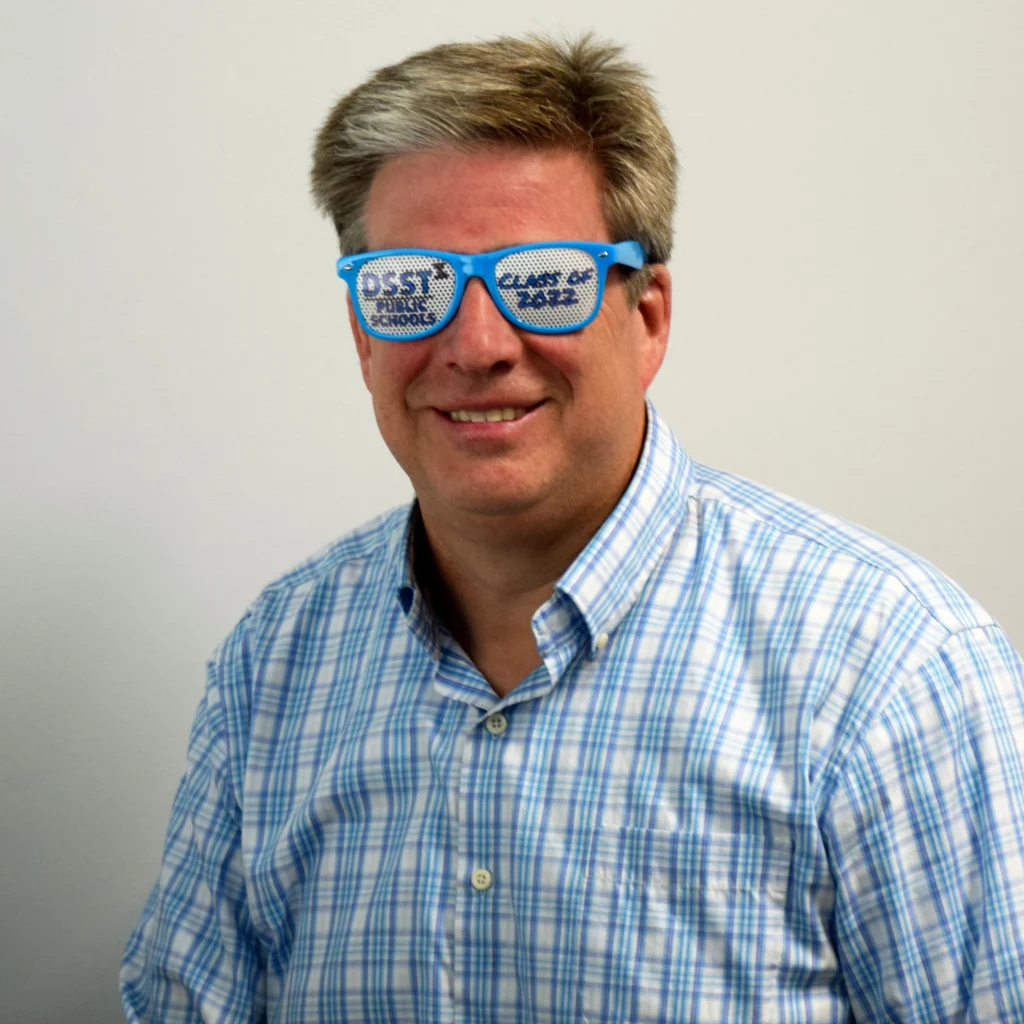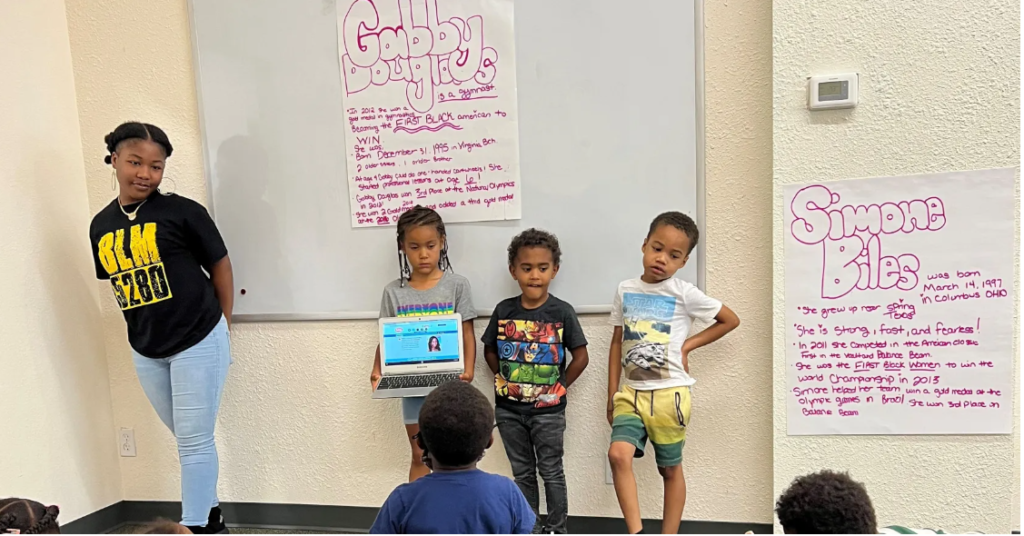(Editor’s Note: This is part two of an interview with DSST CEO Bill Kurtz where he talks about equity, career/tech ed vs college, what DSST has meant to Central Park, what he’s most proud of and what he may do next. Part one was posted April 17. Read part one of the Kurtz interview here.)
Bill Kurtz, the founding CEO of DSST Public Schools, is stepping down in June after 20 years running the state’s largest and most successful network of charter schools.
Kurtz opened the first DSST high school in 2004 on Montview Boulevard at Valentia Street in what was then the initial phase of redevelopment of the former Stapleton airport site which is now Central Park. The network now boasts 16 middle and high schools that serve 7,200 students in Denver Public Schools and Aurora Public Schools (four DSSTs are in Central Park). After this year’s senior class “walks” for their diplomas in June, more than 4,200 students will have graduated since the first departing ceremony in 2008.
And as DSST grads before them, 100% of the class of 2024 has been accepted into four-year colleges. Go here for more about DSST’s impact and timeline of the network’s development.
Kurtz, 55, recently sat down with Central Park Education News to talk about his groundbreaking career overseeing an innovative model that strives to educate well an economically and racially diverse student population. Since its first school opened, DSST has far exceeded expectations and had great success educating lower-income and students of color that DPS, for the most part, fails. A fact sheet on DSST is at the end of this Q & A. Go here for more about DSST and its many accolades and awards.
CPEdNews: The word equity gets overused and it’s misunderstood or not understood at all by a lot of people. They say it because that’s what everyone else says. What does equity mean to you in terms of what your schools deliver?
BK: Equity, first and foremost, has to be about getting all of our kids to the level of learning and proficiency that is excellent for everybody. Equity fundamentally in this world has to be about preparing all kids to be able to get a world-class education, to make choices in their life and to have the privilege and the opportunity of an amazing education.
And we at DSST are falling short of that. Denver is falling massively short of that. Our mission says that we want to eliminate educational inequity. But there’s also a piece of how we make sure we’re honoring people’s backgrounds and experiences and culture. How do we also provide a space where people can belong.

Lastly, I think it’s important to recognize that people, because of systemic realities, require different things. Sometimes we invest more money and more resources for those who have had the least access.
I think that’s an important component of equity, recognizing that there are different needs.
And if we’re going to get everybody to the most equitable outcome of a world-class education, it’s going to take different inputs based on their life experiences and what our systems have done to either prevent or create access for them.
BK: I think we have tried to tackle all of those, and those are critical to who we are. And we have a long way to go. I mean, we can’t claim victory, nor can anybody else right now, and that should drive us to get better.
CPEdNews: You’re familiar with criticisms about DSST. That it doesn’t have to take all kids, doesn’t take kids after 10th grade, that DSST can be selective, you can counsel kids out, that kind of stuff. Talk about how you’ve addressed those criticisms.
BK: We (society) like to tear down success as opposed to celebrating success. And people want to find the reasons why they can explain it away as opposed to saying, well, how can we do more of that?
And that’s not to say that we’re perfect or we’ve done it perfectly. We haven’t. We are probably more dissatisfied with what we’re doing than other people are outside the organization.
One, we’ve always tried to focus on what is best for our students and families, what is best for our kids, and that’s our North star, not what people are saying about us. Secondly, I think we have a great deal of humility, and I think we have always been our toughest critics.
And thirdly, we always look at any claim that people have about who we are, and we’ll say, “Let’s look at the data and see if it’s actually true.” And I think what we found most of the time is that the data really didn’t bear out the claims.
For a long time, we didn’t serve the right level of students with special needs because we weren’t allowed to (by DPS). Now we have over a hundred kids in center programs (for special needs students). We’re probably one of the largest providers of center program services for students, as a charter, in the country.
The kids, they’re just pawns in adult conversation.
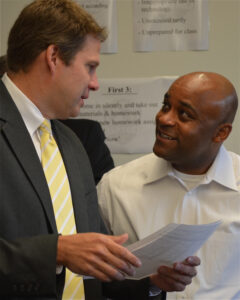
CPEdNews: The idea of getting all students accepted into college was uncommon when you started and very ambitious. And risky, really easy to fail. It was to make sure they had the choice to go to college if that’s what they wanted to do.
But over the last 10 years or so, career tech ed has really gained momentum. There’s been a recognition that not everybody wants to or should go to college. Maybe they train for a trade, maybe they get a certificate, an associate degree.
How do you see stressing college versus the fact that maybe there are kids who really don’t want to go, but feel like they have to since that’s the DSST way?
BK: The data is clear that a college education has more value to a young person today than it did 20 years ago. And there’s so much noise out there. And yes, universities are not always effective. And yes, they don’t run their institutions oftentimes as well as they should. And yes, they’ve been distracted by all sorts of crazy things. And yes, they’re very expensive. All that is true. And I’m not defending the higher ed sector.
They need to change lots of things. But the simple reality, if you care about data, is that the best chance a student has in life is to get a college degree. I’ve always said that what the most privileged, knowledgeable people in a society do is always the right thing, right? Sure.
I don’t know anybody in the upper middle class in Denver or across the country that isn’t still sending their kids to college.
Have not seen it. And what they’re going to do for their own kid, why do they not want that for other kids?
And I’ve heard everything in the book like, “Well, not everybody should go to college. We need more plumbers; we need more electricians. Where are we going to get them? Those are good jobs.”
I’m not saying they aren’t good jobs, but every single person with privilege in this country that I know of is still sending their kids to college and giving them the opportunity to get the (high school) education to then make the choice. And we just have this idea that we can decide for other families what’s best for them, but we’re not going to apply the same standard for our own kids. And there’s more hypocrisy in this country around this issue right now than I’ve ever seen.
And the strongest proponents of not all kids going to college happen to be the very people that are sending every single one of their kids to private schools that cost $75,000 a year. I’ve been in many settings where I’ve heard people say these things, and I ask them, “So what are your kids doing? ‘Oh, they’re going to Middlebury. They’re going to this school.’ ”
Oh, okay, so you’re telling me that a low-income family or black and brown family should not have that opportunity because we need more plumbers. We need more electricians. Right. I get it. Now I understand.
So, for some kids, it’s good, namely your own kids, but for other people’s kids? If we care about data and we care about human potential, it is nonsense. Now, does every college education work? No. Does every college do a great job of kids? No. That’s not the low-income kids’ problem. That is our problem for them.
You’re going to ask them to sacrifice their future so we can try to clean up a system that’s not working very well. No, no, no. The logical, rational, right thing to do is still go to a college that will graduate them and get a college degree because the data is entirely clear on this.
So, I have no apology. They should have the choice. And if they choose not to go to college, at least they’ve chosen the best opportunity for them.
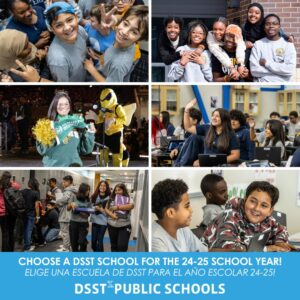
BK: What we’re trying to do is go back to a system that basically says, we’re going to sort kids. And that is a travesty. And when you look at career tech programs, tell me who’s in those programs, and you’re going to see a lot of kids who are black and brown, who would’ve been sorted into those programs. I do not see in our most privileged high schools huge demand for career tech.
They want AP (advancement placement), they want IB (International Baccalaureate). They want college track. I want the higher education system to get better. It needs to get better, but that is not on the backs of our kids. That is on our backs. And until the data changes and until we as the privileged adults in this society change our behavior, we should be working like crazy to ensure all our kids have the same opportunity.
CPEdNews: Have you been able to track how many of your grads go on to graduate from college?
BK: I think it’s in the 50%, 55%, 60% range. We’re very high. And we’re seeing that kids are getting higher paying first jobs and they’re going into STEM fields. And there’s nothing surprising about that or revolutionary because that’s what the data says will happen.
Nobody should be surprised by this because that’s what happens. And that’s what happens with all our kids who come from privilege. Right? I’m unapologetic about that. We can’t change focus because then we’re basically looking at a young person saying, we’re going to sacrifice your future for some idea that we think should really work in our society that’s unproven.
CPEdNews: That’s what you want to do, make sure all students simply have the choice to go to college if it’s what they want to do.
BK: Yes. I have no problem with a kid from DSST who has thought it through and has had multiple options, choices, including financial aid and a full package to whatever, Boulder or anywhere else. And they say, no, I want to go a tech route because I’ve always wanted to be electrician and I’ve checked out the options and I have a choice to make. The choice is mine, and I want to make that choice. . .. We want a kid in Montello to have the same choice as a kid in Hilltop. Period. End of story.
CPEdNews: How are you feeling overall about student achievement in your schools. Are there areas you think are in real need of improvement?
BK: We have a long way to go. There are certainly places that I feel good about. I like our college enrollment, college success, those are the ultimate end goals of our organization. We’re still doing really well, but when it comes to progress and learning along the way, we have to make a lot more progress than we are right now post COVID.
And while our (achievement) gaps are significantly smaller than DPS, they’re still too big.
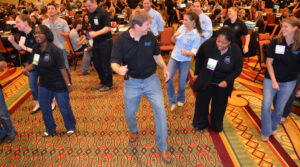
In 2015 or so, there was talk about eventually having 22 DSST schools (the network has a total of 16 middle and high schools). Was that rather aspirational, or did things you have no control over get in the way of that, or is it still on the agenda?
BK: A lot has changed since then. One is, the city is losing kids, and so the need for new schools is much less than it used to be. Number two, our partnership with the district certainly went from being great to the district trying to not partner with us anymore and identifying us as a problem. (In 2020, DPS rejected a new DSST high school in Montbello even though its middle school was one of the top schools in the city. The state board of education later overruled DPS and the school was allowed to open.)
It’s very disappointing because we had a great partnership for a long time where we put our students and families first. And unfortunately, towards the end of the last decade, people decided that the interests of adults and the politics of the city were more important than students and families.
It’s never been about putting a set number of schools in Denver and gaining a certain amount of market share. It’s always been about how do we work with the district to build the best school system possible for our students and families and we’ll play the part that we can play.
CPEdNews: Denver used to be a hot bed of reform but that’s obviously changed. What does school reform mean anymore? Is it applicable to Denver?
BK: I don’t know. We can call it whatever we want. I don’t think we cared that much about reform or this or that. We just wanted to work collaboratively to build the best set of schools to serve the students and families of the city. We had a vision to do that and to do that together and to provide all sorts of different kinds of schools to do that. And I think today we don’t really have a vision for that.
And we seem to be more focused on the politics of governance (by the DPS board) as opposed to how do we create a portfolio or a set of schools that serve all kids and families, no matter if they’re innovation, charter or district.
I think we’ve lost a collective sense of how do we best serve all kids together, which is what I think a public school system should be, right?
What do you think DSST has meant to Central Park?
BK: It was certainly a big deal for Forest City (original master developer of Central Park; DDST was the first secondary school in Central Park, then Stapleton; Westerly Creek Elementary was the community’s first school in 2003). They certainly needed it at the time, or it was certainly a boost for them to have this new school going in.
We have two campuses in Central Park, and we’ve been really grateful to have the opportunity to have schools in the community, to partner with the community and with Forest City and district schools. That’s been an honor. My hope is that we have been viewed as a school that serves all kids, that we’ve had an opportunity to bring not just Central Park kids to our schools, but also kids who live in the surrounding communities.
CPEdNews: What are you most proud of?
BK: I think there’s two things. Number one, I am proud that we have had the opportunity and the great joy of being a part of so many amazing young people’s journeys in life. And I think that we have exceptional students who have gone through our schools and gone out into the world and done amazing things.
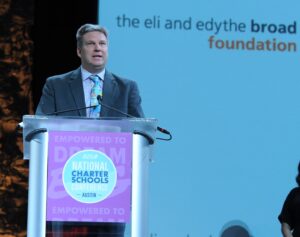
It’s so fun to see so many of our alums leading the way in so many parts of our community today. I think we provide a school community where young people can grow, learn, flourish and become their best selves. There’s nothing better that you can ask for in life than creating a community institution where people from all walks of life, all backgrounds, all ethnicities, all income levels, can become their best selves through the community of schools that we have.
Number two, I think we have changed the belief in what’s possible in Denver, and frankly Colorado.
BK: When we started everybody thought we were absolutely crazy to make a commitment to say a hundred percent of our seniors would go to four-year college and they would have the opportunity to do that. And we got all sorts of questions from people about who’s going to be in your school, which was a way of asking if you are going to have low-income kids in your school. Are you going to have Black and Latino kids in your school? They said that sounds ambitious. And people thought it was unrealistic and a bit crazy and doubted us every step of the way.
I’m looking at spreadsheets today that show all of our schools getting a hundred percent of our kids into college in 2024. And it’s happened almost every year and in almost every school. And that hundred percent represents the fact that every single child who goes through a K-12 system in this country today should have a choice and should have the choice to be able to make on their own.
And unfortunately, many kids who come from Black and Latino families in the city still don’t have that choice and they don’t get there.
If you look at the college going numbers, DSST is at the top of the list in Denver, four of the five top schools. . . the power of belief changes a lot of communities and a lot of situations in life. And I think that our students have proven to everybody that can happen for all. And so just more than anything, it’s the belief that that can happen and that it’s true because it has happened.
I’m just so proud of the fact that we can have a mom wake up in Montbello or in the Cole Whittier neighborhood or the southwest part of town and truly believe that their child is going to go to college because there’s a DSST school in their community.
CPEdNews: Any regrets?
Oh, there are a million regrets.
BK: I have a deep regret that we were unable to continue to enroll students from the Central Park community. There’s a lot of factors and a lot of reasons, and it’s not worth going into right now, but I have lots of regrets.
I think that was a missed opportunity. I think the vision of the community and the city was to create highly integrated schools in a highly integrated neighborhood. And I think that there’s a lot of factors why that didn’t happen. I regret the fact that as an entity we were unable to fulfill that vision, particularly at our Montview campus. But I think we have a great school and I think we have a great community, and we see people come back, which is great.
CPEdNews: So what’s Bill Kurtz’s next act? Any ideas where you’re going, what you might do?
BK: Hopefully that will be serving other people and be impactful. But right now, I’m focused on trying to finish at DSST really strong and then I’ll start to think about what’s next. So, there’s no secret plan on our agenda. I’m open to exploring possibilities after I leave.
CPEdNews: You think it’ll be in the education field in some way, or you’re not sure?
BK: I think it’s certainly a good possibility, but certainly I’m going to open up the aperture and see what comes my way in terms of opportunity to serve. I’m sure there’ll be a few.
DSST Facts
- 16 Middle and High Schools (14 in DPS; 2 in Aurora)
- 7,200 students
- After 2024 graduation: 4,200 graduates since 2008.
- Number of employees: 950; teachers: about 700
- Breakdown of teachers by race: 35% staff of color
- Network annual budget: $100 million
- Fundraising income: $10 million annually
- College matriculation: 100% admittance annually
- Student racial/demographic breakdown
- 61% Hispanic/Latino
- 20% Black/African American
- 11% White
- 4% Asian
- 4% Two or more races
- 1% Other
- 77% Free and Reduced Lunch (FRL)
- 53% Male
- 47% Female
- <1% Transgender or Non-Binary

